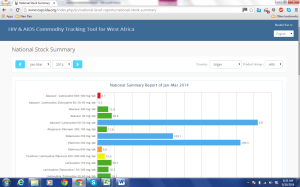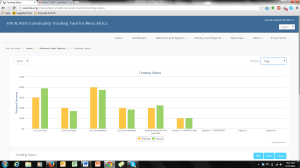Alerts of stock-outs of life-saving medicines for antiretroviral therapy (ART) and treating opportunistic infections have emerged from a number of countries in West Africa. Several root causes of stock-outs have been identified such as poor coordination and information sharing among partners.
The West Africa HIV and AIDS Regional Dashboard, called HIV and AIDS Commodity Tracking Tool or “Outil de Suivi des Produits du VIH/SIDA (OSPSIDA),” was developed by the USAID-funded Systems for Improved Access to Pharmaceuticals and Services (SIAPS) Program for six West African countries—Benin, Burkina Faso, Cameroon, Guinea, Niger, and Togo–in order to better manage HIV and AIDS commodities.
The Regional Dashboard’s function is to capture, track, aggregate, and disseminate information about antiretrovirals (ARVs), rapid test kits, and other HIV and AIDS commodities to support evidence-based decision making in the West Africa sub region.
So far, the dashboard has been used in Togo and Niger—results from these two countries show how the tool can change the way managers of HIV program sees and use data for decisions. It captures stock status of the HIV and AIDS commodities as well as patients’ information to predict risk associated with stock-out and over stocking.
In Togo, even though the ARV logistics management information system (LMIS) monthly reporting rate is approximately 100%, the dashboard software showed that management needed to start reviewing the quality of the reports submitted from the sites as many of the entries were found to be wrong. Additional dashboard data showed that at the end of February 2014, there was a risk of stock-out of 11.1% of ARV products that will affect 5.9% of patients currently on ART. The Togo team is working to speed up request for procurement. OSPSIDA automatically calculates the subsequent months’ opening stock and will not allow changes to be made to opening stock in subsequent months; it will also calculate closing balance and this will prompt data entry officers to check if there are errors in the data.
In Niger, the quarterly ARV LMIS reporting rate is very low; the country also had the same issue of data quality as found in Togo. The dashboard showed that 26.1% of ARV products are in risk of expiry (products with more than 24 months of stock). Reports from the software showed that particular products will be available for at least 100 months based on Average Monthly Consumptions (Figure 1). This has prompted the program managers to seeking ways to transfer the product to another country. Another important outcome of the deployment in Niger is the decision by the country to review the LMIS reporting format to improve quality of the data as currently the LMIS form does not collect losses and adjustments. Instead of accounting for losses through damage or expiry it is considered sometimes in their LMIS forms as quantity consumed.
OSPSIDA will not only provide early warning of risk of stock-out but will also improve the data quality management to improve the general management of the stocks. OSPSIDA will also aid in fund management by providing gap analysis budget resources available and their allocations (Figure 2).



